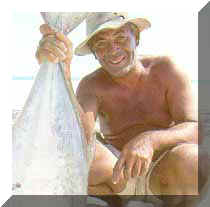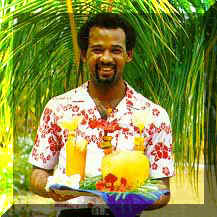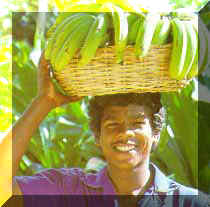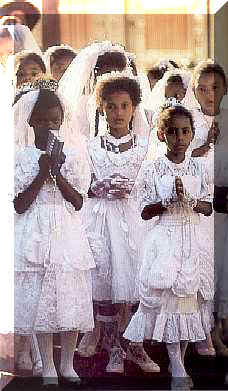[ ISLANDS
][ GET AWAY ][ HOTELS ][ CUISINE ][ WHAT TO DO ]
[ NIGHTLIFE ][ HISTORY ][ ********** ][ RELATED
LINKS ]
![]()
Culture
![]()
The combination of the different races, history and the tropical environment of the sea and the land have provided the catalyst for what the Seychellois people are today. Their language, music, dances, art, cuisine, and architecture are unique and are a reflection of their heritage.
Ethnology
There has never been an indigenous, or truly native or aboriginal
inhabitant of the Seychelles.
The ethnic makeup of the Seychellois people is creole, descended mainly from French
colonizers and their African slaves that first settled in the islands in 1770.
During the 18th century, many more African slaves freed from slave ships by
the British navy were set free in the islands. Other colonists came from Mauritius,
southwest India, and the Canton provinces of China. The offspring of these unions
resulted in an ethnic meltingpot of smiling people of many differences in color and all
understanding and tolerant of one another.



Languages
The vocabulary of the Seychellois- Creole language is based on 18th
century French roots, mingled with Kaffir, Malagasy, Bantu, and Indian elements. It
is definitely more than just pidgin French, but a language in its own right. It is
an honest, thorough, and comprehensive reconstruction of French from its roots to suit
African requirements and idiom. It has a full set of words or expressions for casual
or conditional events. The speaker is able to express himself adequately and
fluently in all matters affecting daily life. For abstract concepts, the English or
French language provides the missing links. It is highly unlikely that the language
will develop into a widely used written language with a literature of its own. Under
British colonial rule, legislation was passed in 1944 to where the colonial government
assumed responsibility for public education and English was to be the first medium of
instruction. In deference to persons of French descent, it was also recommended that
French would be the second language. Since independence in 1976, and the coup of
1977, Creole became the official language, with French and English still in
widespread use.
Religion


The predominant religion of the islands is
Catholicism, mainly as a result of the influence of the first French settlers. The
British established the Anglican church, primarily on the island of Mahe, the main island
and the seat of the British colonial government. The old African beliefs and rituals
are still practiced by some of the older generation as an adjunct to Catholicism.